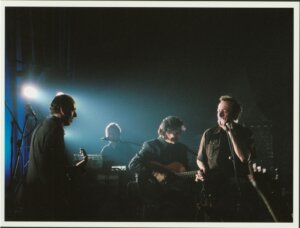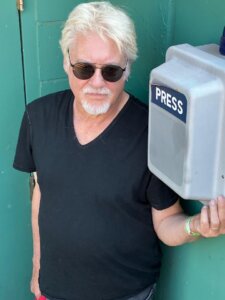If they were ‘the only band that mattered,’ is he the only Jewish guitarist who matters?
The Clash and BAD’s Mick Jones, now 68, is the son of a Welsh father and a Russian Jewish mother

Mick Jones, circa 2012. Photo by Getty Images
Whenever anyone references The Clash — the incendiary punk rock band that exploded onto the London scene in 1977 and became huge everywhere a few years later with London Calling and Combat Rock — the first reference is, almost inevitably, their late singer-songwriter-guitarist Joe Strummer. The second reference: Mick Jones, Strummer’s partner in all of the above, but it is generally assumed, the lesser partner.
“I like Strummer as much as all the other Clash fans,” the Waterboys singer-songwriter-guitarist Mike Scott told me when I interviewed him. “I think partly because he was such a magnetic frontman, one of the greatest rock ’n’ rollers of all time. No argument of that. And also, because he died, it puts his life into a different relief. Yet, Mick was crucial and also Mick was the one who made the records, the record crafter in The Clash. A wonderful musician and a wonderful guy.”
Jones, who turned 68 on June 26, was the lead voice on the softer, more sinuous songs such as “Train in Vain” “Should I Stay or Should I Go?,” “Stay Free,” and “Lost in the Supermarket.”
Scott even wrote a song about him, “London Mick,” an upbeat rocker on the Waterboys’ 2019 album Where the Action Is.
“I was a Clash kid under the band’s spell,” Scott sang. “My guitar hero … when he left The Clash he took some stick/Sent him flowers when he got sick.” (Jones was hospitalized for several months in 1988 for chickenpox and pneumonia.)
Yes, Jones was also the fired partner. Strummer sacked him in September 1983.
“Mick was intolerable to work with by this time,” Strummer said in the documentary about The Clash, Westway to the World. “He wouldn’t show up. When he did show up, it was like Elizabeth Taylor in a filthy mood.”
Strummer felt Jones had taken on a pop star persona and in a statement issued at the time said he’d “drifted away from the original idea of the group.”
“I was just carried away really; I wish I had a bit more control,” Jones said later. “You know, you wish you knew what you know now.”
But let’s backtrack.
Back to Boston

I was there for The Clash’s first Boston-area gig, at the long-defunct Harvard Square Theater in Cambridge. February, 1979. The Clash took the stage and exploded. To this date, I’ve never heard a better (and more apropos) opening salvo than “I’m So Bored With the USA.”
Strummer wrote the song, he said, about how bored he was with American pop culture, which was shoved down the English kids’ throats via TV. Particularly galling, the multiple cops ’n’ killers shows; hence the line, “Killers in America work seven days a week.”
The crowd was one with the band. The Clash was bored with the USA, we were bored with the USA and the song was furious. Our boredom certainly had something to do with the staid mid-’70s rock that had been everywhere pre-punk and the music at the top of the charts.
The Clash played 16 songs, following “Bored” with “Guns on the Roof” and “Jail Guitar Doors,” the set a mix of songs from the two albums, The Clash and Give ’Em Enough Rope, plus several singles. They capped the set with a one four-song encore, closing with “London’s Burning” and “White Riot.”
In the middle, there was “Police and Thieves,” Junior Murvin’s reggae song that The Clash made their own. A long siren call signaled its start and the spotlight roamed the stage — you know, the spotlight the cops used to catch the robbers — and Strummer and Jones kicked in with the terse, staccato riffs that dominate the tune, Strummer singing passionately.
None of the Clash guys talked much between songs, which were delivered loudly, quickly and with the utmost freneticism. Drummer Topper Headon added punch. Jones and bassist Paul Simonon were like wildcats, crisscrossing the stage all night, frequently winding up at the other’s mic stand. When Jones didn’t make it on time to sing harmony, it didn’t matter; he simply joined in on the following line.
“They worked so hard, sweating it,” recalled Jeff Hudson, keyboardist for the opening band, the Rentals. “They ended their set and all ran toward us backstage and collapsed in a pile in front of us on the floor. I remember looking down on them breathing heavy. They gave as much energy of any band I have ever seen. They carried their political messages as an honor. On a mission to save the people for real.”
The Clash climbed the ladder of success, but it all fell apart in 1983. The previous year Headon had been sacked for abusing heroin. Then, Jones. Three other musicians came in and The Clash staggered on for three years and one more album, Cut the Crap, before Strummer pulled the plug.
The Jewish punk scene

New York punk rock had a pronounced Jewish presence; London punk rock, not so much, though certainly Sex Pistols manager Malcolm McLaren and The Clash’s manager Bernie Rhodes had considerable influence and political pull.
Jones was born in London to a Welsh father, Tommy Jones, and a Russian Jewish mother, Renee Zegansky. His maternal grandmother Stella, whom the young Jones spent most of his life with, was born in 1899 to Jewish parents in Russia and escaped the pogroms by emigrating to the United Kingdom.
Jones had a glam-rock band in the early ’70s called the Delinquents. Then, punk hit and Jones and future Generation X guitarist Tony James joined the London SS. Then came The Clash.
Strummer and Jones both wrote songs, but as The Clash developed, Strummer emerged as the primary singer and songwriter, the more animated guitarist, the left-wing firebrand. He was, as it turned out, captain of the ship. The firing of Jones sent shock waves through the punk world. The Clash without Jones? Unimaginable. And the post-Jones Clash did not go over well.
After The Clash, Jones briefly joined General Public before founding the dance-and-groove-oriented Big Audio Dynamite.
“I used to be in a group that was relevant to what was going on then,” Jones told me in 1987. “We’re just doing music to what is relevant to what’s going on now. I think The Clash was a great band at the time, but I try to look forward as often as possible and not look back. Our music brings all sorts of things together and it’s trying to get people back together, too.”
I caught up with him again in 1992. Jones was playing with his second version of the band, called Big Audio Dynamite II. He was the sole remaining original.
“The vibe is brilliant,” Jones said. As did the first version, B.A.D. II treated music as a collage of hip-hop, funk and punk, utilizing sampled bits from others’ records. They scored a hit with the song “Rush” in 1991.
This second band, with added guitarist Nick Hawkins, was different, Jones said, because “we’re pulling back the reins a bit. There’s something to arranging songs so that you hear just one thing at a time. It’s finding these balances as you continue to work. It’s like streamlining and honing down.”
“I feel better about what I’m doing anyway, which is chords and melodies,” Jones continued. “I’ve sort of come to terms with all The Clash stuff and I’m trying to enjoy life as much as possible, to not hurt anybody and try and be of some use.”
Jones considered himself both the singer-guitarist and the “amicable, cajoling” MC of the show. “It’s like a Kennedy Space Center run on bits of string and wire, still very tentative,” he said. “It’s like performing without a safety net. When we first started, if something went wrong that would be it. We’d be over, finished. Now we just play along with somebody else’s record till it’s fixed.”
Jones, who was then all of 37, mused about the idea of being an aging punk rocker. The fast and furious punk bands of yore almost seemed to have a self-destruct button that came with the package. But, Jones said, “I’m actually kind of proud that there’s so many people that came from the same place as we did that’s still doing it.”
Jones went on to a number of other projects, most prominently Carbon/Silicon with old bandmate Tony James and Gorillaz with old Clash-mate Simonon.
Last hurrah with Joe Strummer

A friend of mine, George Binette, found himself the beneficiary of a happy coincidence on Nov. 15, 2002 — the last time Strummer and Jones shared a stage.
A then-partner had tipped Binette off that Joe Strummer & the Mescaleros were playing a charity gig for the Fire Brigades Union. He’d lost track of Strummer’s post-Clash career after years of fanatical devotion, but picked up a couple records and, impressed by the sound — and the cause — decided to go.
“So, I set off on a rain-sodden Friday at the end of a seemingly endless working week,” Binette said. “Uncertain of getting a ticket to an apparently sold-out concert, I dipped into a nearby pub to dry off and down a swift pint. A few gig-goers had clearly gathered and I struck up a conversation with an affable bloke who ran the band’s website and just happened to have a spare ticket. I gladly parted with £12.50 and headed to the crowded venue.
“While most were supportive of striking firefighters, everyone was there first and foremost to see the legendary Clash frontman. I planted myself several yards from the stage where I somehow found myself standing next to Mick Jones. Hairline receding and looking haggard, he still cut a figure of sartorial elegance with a smart overcoat draped over his arm.”
Binette worked up the nerve to make small talk. “Mick responded with polite enthusiasm, and we eventually moved on to a recent TV appearance and his work producing The Libertines’ debut album. I did have the distinct sense that I would see him again that night.”
Strummer and the Mescaleros took the stage. After about a dozen songs, they dug into The Clash catalog for “Rudie Can’t Fail” and “(White Man) In Hammersmith Palais” and three covers associated with The Clash, Junior Murvin’s “Police and Thieves,” Eddy Grant’s “Police on my Back” and Bobby Fuller’s “I Fought the Law.” Gig over.
But not quite. The Fire Brigade union’s general secretary presented Strummer with a statuette as a token of thanks as the raucous crowd demanded encores.
“Then,” says Binette, “I saw Mick Jones mount the stage, strapping on a Les Paul and the band tentatively striking up the loping reggae of ‘Bankrobber’ followed by ‘White Riot’ and, inevitably, ‘London’s Burning.’ Jones and Strummer playing together on a public stage for the first time in over 19 years! I was in rapture!
“I left the building for the long trek home with the feeling that I had witnessed something more than a footnote in the annals of rock history. The whole evening had been a rekindling of the spirit — real or imagined — of The Clash.”

















